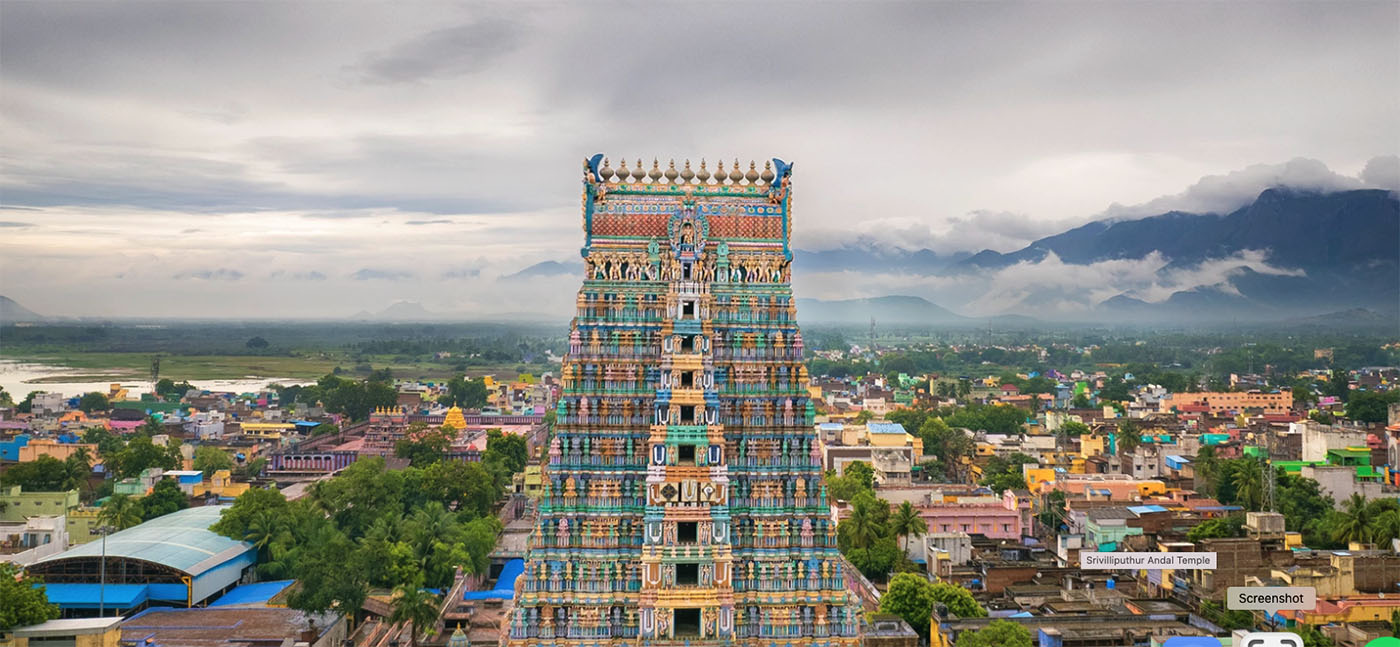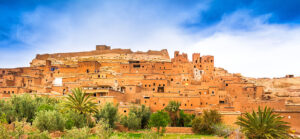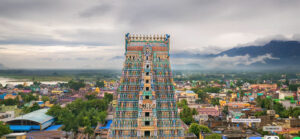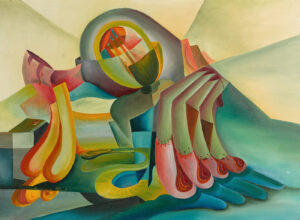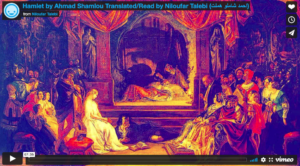In Andal, The Autobiography of a Goddess (Zubaan Books / University of Chicago Press), Ravi Shankar and Priya Sarrukai Chabia translated and edited devotional poems by Andal, also called Kothai, Nachiyar, Godadevi, and Tirumaal (or the ‘Sacred Dark One’). Andal was a 9th century CE Tamil mystic poet born in Srivilliputhur and elevated to the status of a goddess mere centuries after her disappearance as a teenage girl. She was the only female Alwar saint who worshipped Vishnu and who are among the earliest practitioners of the bhakti movement in medieval India which emphasized the accessibility of the divine to all in various regional languages, not just the Brahmanical Sanskrit of the past. She wrote two great Tamil works, the Thiruppavai and Nachiyar Tirumoḻi, both of which have been collected in The Autobiography of a Goddess.
Ravi Shankar
The Song of the Kuyil Bird
(Mannu perum pukal Madhavan)
Pining heavy each moment for my dark lord Madhava whose renown eternally resounds,
the one cobalt as sapphire’s irradiating center, is it right bangles should slip from my wrists?
Kuyil—birds from the peppery groves of laurel, pear, wild poppy and nalal, fly to his coral lips,
linger there cooing his many names, insistently, hypnotically. Ask him to hasten to my side.
The spotless being holding a silver conch in his left hand will not show his true form
to me. He arrives through an underground spring to liquefy my house’s foundations,
to seep into the walls and overflow my heart: pure torture. Warbling kuyil—bird drunk on
honey from the twitching stamen of magnolia blossoms, intercede to the lord of Venkata
on my behalf, murmur, get him to come. From a chariot, he felled the Lankan demon
Ravana, burst his many heads with a storm of arrows and yet nowhere do I see his form.
O lithe kuyil—bird, living fulfilled with a beloved mate in a grove fragrant with the scent of fruit
and petals, one pulse in synchronicity with all being, do me this favor and call my gem to me.
My bones are immaterial, the lance of my eyes is unsheathed, insomniac, sunken in sorrow
even when I whirl round like arms of galaxies. Still I do not see the boat called Vaikuntha.
Dear kuyil, you know well the pangs of parting from your beloved, please go to the golden—
hued, Garuda—mounted lord and convince him to come to me. I long to bathe his long feet,
the dark lord of Vengadam, where swans bob, where my eyes—two fighting carp knowing
no rest—can finally settle. I’m begging. Listen bird, I’ll even give you my pet parrot
in exchange, my companion fed on nothing but milk and sweetened rice. Just please call
the lord who spans the world and tell him his lover grows impatient for his appearance.
Hrsikesa, rhapsodized by even gods, enslaves me.
I pine. I languish. I waste away. Fullness
of breast wanes, pink lips turnip, the pearls between them begin to jaundice while I wait.
Sleeping avian, rise from the cluster of hills, tell my true love to come and I will bow
to you in gratitude. Not stars, nor sea
can compete with the enormity of the desire
I have to unite with him. I can barely speak. My friends don’t know what to say to me.
Feathered thing, what do you have to gain by hiding from me? In reality, if you helped,
your merit would be enormous. The lord
of harmony whose strong arms hold a saranga
bow has heard and returned my vow I swear! Little mango—grove dweller, just go to Tirumal
tell him to hurry to me. You’ll see what I’ll do to him once I have him between my fingers.
I am caught in the net of Sridhara, fruiting
in anticipation, ripened and ready. I’ll burnish
my words no longer. Either ask him to appear, or else bring me his golden armlet. Simply put,
if you wish to continue to live in this grove, you must do one of these things for me. I yearn
for the measurer of the worlds. I’m in his thrall. I can’t resist his power. Everything else, moon
or southern breeze, augment my heartache. Listen, winged blotch, don’t linger in this grove
and add to my anguish with your nonchalance. Go bring Narayana to me! Fly with the wind.
Otherwise I’ll drive you out of here with a stick.”
So the long—eyed maiden sang, so stricken
with longing for the lord, it rivaled the ocean’s depths and she sent out the black kuyil—bird
to deliver her message and to beseech the maker to unite with her, to wear her garland of verses
that if we centuries later recite, can reveal to us the true name and nature of Narayana.
(Ravi)
The Song of Dark Flowers
(Karkotal Pukkal)
O dark flowers, benediction of sun & elevation
of waves cresting then churning to drown me.
Who hears voices in water? My sole wish
is to drown in the cavity where the tula—petals garland
his chest, to pour torrents of flowers
in a reluctant heap around his magnificent body.
I too rise from aromatic breath to throaty skies,
my love as pure as the blue flame held aloft
in the palm of the one whose inner light
is the distilled and living essence of the Vedas.
O Kottai, your sinewy vine gasps red fruit,
a reminder to the lips of itself, a song of spirit
& senses. Don’t drag my days barbed through me
when I tremble now, truly. I am brazen, fallen
but not repentant nor ashamed, dreaming
his luminous sleep on a forked serpent tongue bed.
Bright jasmine, spare me your smile. I surrender.
If the words that slashed at demonisms prove false
is my birth also just as false?
O black cuckoo what ravaged garden girds
your song? Whirr plaintively instead a blue—
note for the one with a fluttering banner
on an immaculate field who alone holds
the purpose of my life as mere song in his paws
that we will both hear to vanish with us.
O muster of peacocks, at such audacious balletic
forms I fall prostate, inner—mirroring your fan
of eyes like the many metallic hoods whose paralyzing
sway has me swooning. Incomparable peacocks,
limitless imitation could not compare
to your unfurling feathers!
Deprived, shorn of self, a hollowed‚out gourd,
I have nothing left to give. I’ve expended all
at Govinda’s feet, who while dancing with pots,
plucked the stem of me in such a heightened state.
Frozen in ecstasy, is it fair to be further tormented?
Rain, pouring rain, drip on the arbor where my lord lives
like hot wax poured into a clay mold, my heart the ready
vessel for his light melting into shared radiance.
Make him stroke me, bury so deeply
into my being that his tip touches my heart to flame.
Can you rain down that furiously? Pound down please.
O oceans! Just as he set you howling to steal vigor
from your depths, he entered me to smash
the substance of what I had been into shoals .
Can you convey to this cunning force spread
upon a serpent my extreme suffering in the matter?
What defense do I have against such bold glory?
If the blazing lord of Arangam finds kindling of virtue,
then he will reveal what’s outside himself inside of me.
(Ravi)
The Song of the Sandcastles
(Namam ayiram)
O Nārāyaṇa, whose grace is praised
but never parsed by a thousand names.
O Nara, made flesh as Yasoda’s son,
help soothe our suffering, create a balm
for the full moon of Panguni is upon us
and we’ve strung the streets with scents
to welcome Kamadeva, the God of love.
Don’t tease us, great Sridhara.
Don’t wreck our sandcastles.
We’ve toiled over them until our backs throb,
carefully shaping a keep from minute grains,
pinching together pinnacles
and parapets with thumb and forefinger.
Allow us to enjoy the fruit of our labor
O Lord, alpha and omega, let us gaze
with pride for a passing moment
on what we have so carefully built.
Remember when you too slumbered
in human form, as a lovely child
upon the broad hammock of a banyan leaf.
Show us compassion even in spite
of our numerous transgressions.
O ravenous lion that roams the skies
and slumbers upon the vast oceans,
mighty mahout who tamed the wild
elephant. Just to catch a glimpse of you
on the horizon’s arc intensifies our longing.
Don’t tease us with sidelong glances.
Sifting particles of sand, we’ve wearied
our wrists thick with bangles,
even as you lounge on approaching
and receding waves, laughing no doubt.
Don’t wreck our sandcastles.
Storm—dark Lord, you hold us in thrall with
but a word. Even your silences captivate us,
the faint outline of a face we can’t quite make
out bewitches more than magic.
We are innocent children and know
not what to do.
O dearest one, your eyes bloom
like lotus—buds, unfurling to drink us in.
Don’t wreck our sandcastles.
Like curving kolams from a grid of dots,
we form sandcastles with fine white sand
to decorate every threshold.
Even when you wash them away,
even as our hearts break,
even as into thin air we melt, leaving behind
bones to be ground into powder, we bear you
no ill will and don’t question your wisdom.
O Keshava! Two—faced Madhava, are you so blind
to our mortal agony?
Still unripened, our breasts barely pucker
into nipple yet while we shape turrets
from fine white sand, you eye us deviously.
How can we understand your divine purpose?
O all pervasive, all powerful Lord,
you’ve corralled oceans to vanquish demons,
flicked Lanka away like a discarded fruit pit.
Torment us no longer! We have no choice
but to surrender to your whim.
If we could translate the syllables of creation
And fathom the depths of your knowing,
but Lord, dark as pressure in the depths
of the ocean, we are but children in relation to you.
Please recall your love for us,
our love for you.
Spare us our sandcastles!
It’s taken many lifetimes to gather sand
in a broad pot, winnow it so that pure grains
can stick into some semblance
of structure. Why take pleasure in ruining
our play? Why kick towers we’ve spent
so long to make? You finger the edge
of a flaming discus Lord, growing ocean—
dark yet sweet as cane. Don’t you know even
sugarcane is bitter to a heart inflamed with
such keening craving?
You cross our courtyard just to show us
your sublime smile, never revealing
whether or not you intend to smash
our sandcastles and our hearts as well.
O Govinda, who leaped to span
the waist of the earth and the wet
of the sky, if you embrace us like that,
what will our neighbors say?
“O Lord who sipped the nectar
of Sita’s lips, please don’t scatter
our sandcastles!” so the young girls
of Ayarpati pleaded in simple words
they improvised as they played hide—
and—seek on the sinuously raveling,
sensuously unraveling avenues.
So sang Kotai of Visnucittan, master
Of Srivilliputhur, that city in the foothills
that resounded with the music of the Vedas.
Those who master these Tamil verses
will most certainly attain
Vaikuntha, that world which exists
beyond the margins of the material
universe, the eternally blissful abode
of Nārāyaṇa.
(Ravi)



